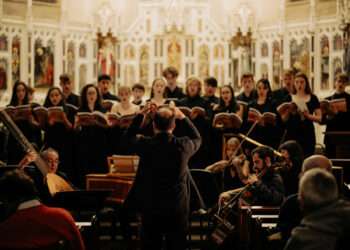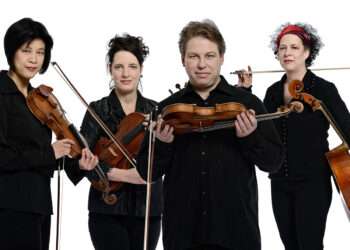The idea of helping scientists by listening to music appeals greatly, so I’m looking forward to tomorrow night’s Musicon concert by The Clerks. It’s called “Tales from Babel – Musical adventures in the Science of Hearing” and it looks at how we pick out voices and process information from a babble of sound. Scientists call it the “cocktail party problem”, but there’s more to it than just how we cope socially with interactions in a noisy room; critical jobs such as air traffic control depend on an operator’s ability to listen to important information without distraction, and I imagine that at a lower level the same applies in busy open-plan offices. It also applies in music of course, particularly in the very early repertoire in which The Clerks specialise, when composers such as Josquin and Machaut revelled in setting several texts simultaneously, but it applies too in opera of course – even in English I can never follow the last scene of Act II of The Marriage of Figaro without surtitles.
The Clerks have put together a programme of early and contemporary music, including a piece created specially for this project called Roger go to yellow three and apparently they’ll be subjecting us, the audience, to listening tests during the concert. The concert is touring, and all the data gathered from the audience will be analysed by the team of Cambridge scientists who are working with The Clerks.
There’s also a website dedicated to the project, at www.talesfrombabel.co.uk which explains a bit more about what the scientists are hoping to achieve, and how the programme was put together. There are also some listening tests on there, which also provide results for the project, so I had a go at them this evening. The first tests how well the listener identifies solo sung words. The second is the “Brungart test” devised for the US Air Force that inspired the project – you have to pick out one set of instructions from several being recited simultaneously. The third test how well we can identify words in two simultaneously sung texts – this last one amusingly uses a 14th century lament on the death of Machaut and replaces the words with two conflicting points of view on the death of Michael Jackson. The first test was easy and I scored full marks, but the others were much trickier and I suspect that as a singer, I should have done better. I’ll be interested to see the results.
I’m not reviewing, because Bachtrack reviewed it in London already – read Emily Owen’s review here – but that probably means I’ll be better able to concentrate on whatever tomorrow’s tests are. So I’ll get to enjoy some delicious polytextual early music and help with a science project. How cool is that?






